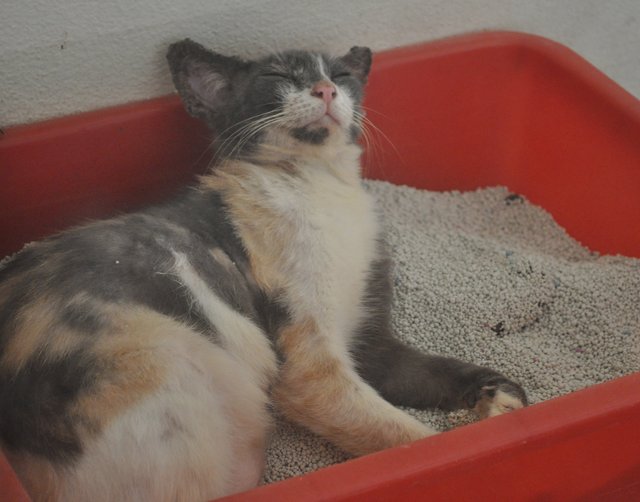A cat sleeping in its toilet is definitely weird and a bit worrisome too! It’s a known fact that felines keep themselves constantly clean by licking and grooming its fur. So if your cat begins to choose its litter box over a neat plush cat bed, it may leave you wondering at first followed by valid concerns.
Some Possible reasons when cleanliness freaks don’t wish to leave their litter boxes alone and ways to change this unhygienic behavior.
- A new home: This may prompt a toilet trained pet cat to seek refuge in its toilet for the simple reason that the litter box smells like its own self and the only familiar space within a new environment. So whether you have just adopted a new cat or have shifted with your old pet to a new home, your cat may feel vulnerable and choose to stay in its litter box as that is familiar territory. Felines mark their territory with their urine. The scent of urine emanating from the litter box is able to comfort the anxious cat.
Add another box with bedding or blanket instead of cat litter in it so that your furry feline has a germ-free option to enter, doze-off and feel safe. Your kitty will appreciate you adding some cardboard boxes in the new home as cats love to spend time in enclosed spaces and derive a sense of security. In due course of time the kitty will begin to explore its new surroundings and use the litter box only when it has to pee & poop.
- When you adopt a new pet to the household: The new addition may stress your mouser that will most likely respond by claiming total control of its litter box trying to prevent the new cat from using it. Another reason why your first kitty will spend a great deal of time in its litter box is because it sees the new cat or dog you’ve just adopted as a threat.
To prevent litter box guarding/territorial dominance, add as many litter boxes as there are cats in your home. Plus an extra cat toilet in a common space accessed by all of them. However some cats feel comfortable in sharing their toilet with their furry mates.
In case the second pet is a dog, make sure your cat’s litter box is placed in an area where the cat can reach without being pried by the dog. Image-docandphoebe.com[/caption]Synthetic cat pheromone sprays are available that can be sprayed around the litter box; this will curb the cat’s desire to hide in it.
- Urinary tract infections: These are caused by bacteria in the bladder and cause pain during urination. Calcium oxalate crystals in the cat’s kidney or bladder form when its urine is too acidic and struvite crystals form when its urine is alkaline. These crystals cause infection in the bladder and also blockage in the urethra. This condition is a medical emergency and calls for immediate treatment else will cause kidney and heart failure.
Dysuria is a result of a urinary tract infection, or presence of crystals or tumors in the bladder. When a cat suffers from Dysuria it is unable to urinate properly because of which it may continue to lie in its toilet so that it can repeatedly try to pee. Apart from an urge to pee and unproductive urination Dysuria also causes painful urination and blood in the urine. There is also immense weakness and fatigue experienced by the cat due to which it is unable to move and keeps lying in its litter box.
-
Diarrhea/gastrointestinal upset: The continuous urge to defecate forces the cat to lie in its litter box. Indigestion can be a result of a sudden change in your kitty’s diet. Loose motions can be caused by internal parasite infestation, colitis or other intestinal conditions.
 A vet examining your cat becomes very important to assess the exact cause of your pet’s behavior of not wanting to leave its toilet.
A vet examining your cat becomes very important to assess the exact cause of your pet’s behavior of not wanting to leave its toilet.
- Constipation: This is a common problem in cats. Cats normally defecate at least once in every 24 to 36 hours. If you notice small pieces of dry stool or the stool isn’t passed once in every 36 hours then your cat could be constipated and you need to show it to a vet. The doctor will be able to tell if it is simple constipation or there is some complicated underlying condition at play.
- Arthritis/Injury: An old arthritic cat will experience pain while climbing into and out of the litter box. Once inside the box it may not want to leave it because of the trouble & discomfort involved in getting out. Similar discomfort is faced when a cat is injured.
It’s best to replace the old litter box with one which has low sides. Also place it close to the feline’s most used sleeping spot. These alterations will make sure it has an easy & comfortable access to its toilet.
Litter boxes even when cleaned regularly by you aren’t something where your cat should be spending extended amounts of time. There is always the risk of falling ill due to the presence of bacteria living in litter boxes. If your pet has started spending an abnormal amount of time in its toilet lately and you are unable to figure out which of these situations apply to your kitty, consult a vet without delay for more clarity on the matter.
